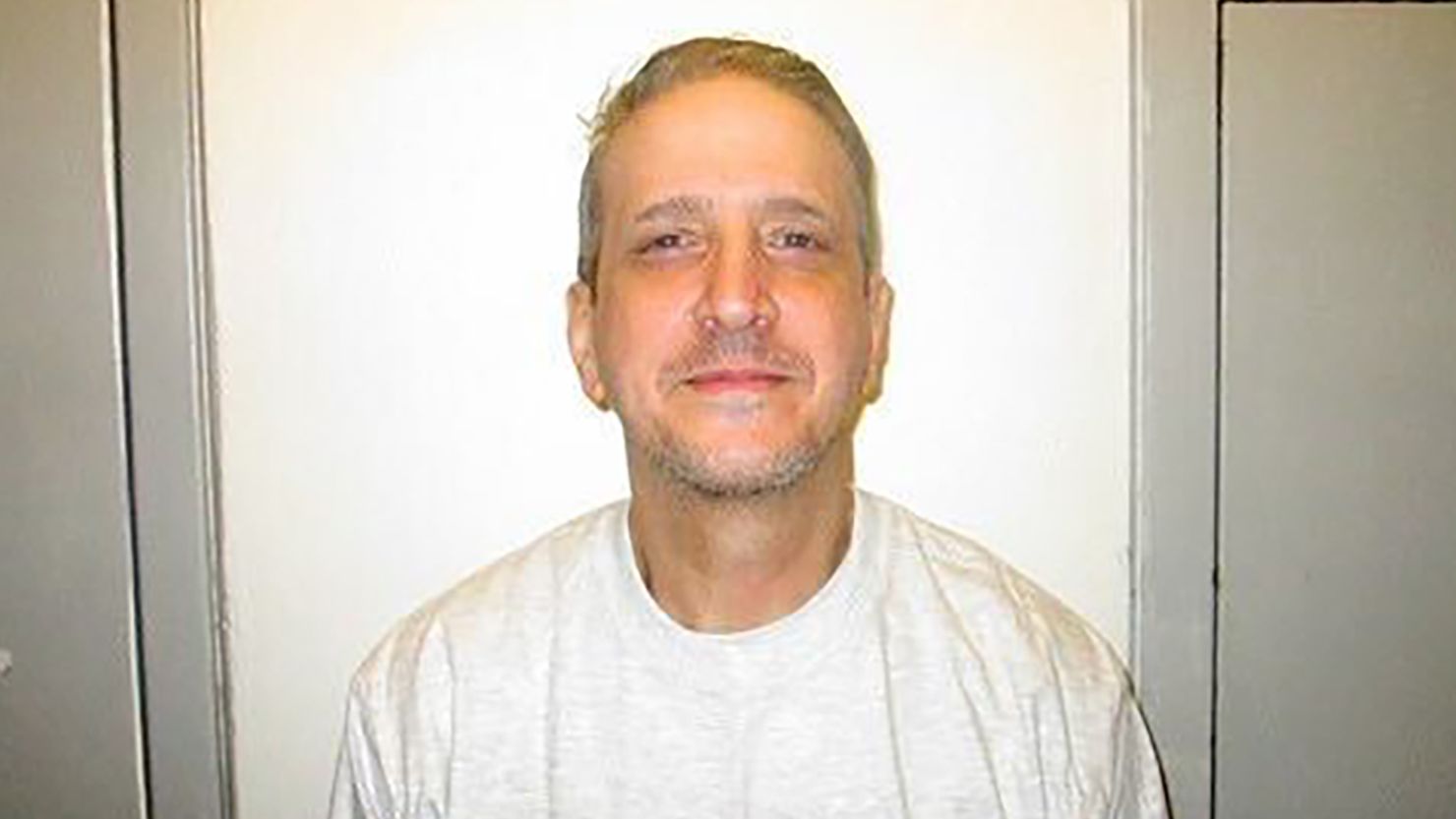Oklahoma’s Pardon and Parole Board on Wednesday denied clemency in the case of Richard Glossip, a death row inmate who has long insisted he is innocent of the 1997 murder for which he’s scheduled to be executed this month.
The board voted 2-2, resulting in a denial of Glossip’s clemency request, which had the support of Oklahoma Attorney General Gentner Drummond, who in an unprecedented move attended Wednesday’s parole board meeting to advocate for clemency.
A fifth member of the board recused from the vote, which followed a nearly three-hour long hearing in which the board heard from Drummond, independent investigators, Glossip’s attorneys and the inmate himself, who in his plea for mercy told the board, “I’m not a murderer, and I don’t deserve to die for this.”
Attorneys for Glossip later filed for an application for a stay of execution with the US Supreme Court. The state’s attorney general filed a response Monday supporting the stay, writing to the Supreme Court that the execution will otherwise move forward “under circumstances where the Attorney General has already confessed error – a result that would be unthinkable.”
Glossip, a 60-year-old former motel manager, was convicted of murder for ordering the killing of his boss Barry Van Treese, whose family Wednesday expressed strong opposition to clemency. After more than 24 years on death row and three reprieves or stays of execution, Glossip is now facing his ninth execution date on May 18, as the state seeks to carry out a series of more than two dozen executions over just a few years.
Another employee, then-19-year-old Justin Sneed, admitted to killing Van Treese with a baseball bat at the Oklahoma City motel. But in 1998, prosecutors told jurors Sneed killed Van Treese in a murder-for-hire plot orchestrated by Glossip. Sneed received a life in prison sentence in exchange for his testimony as the key witness.
Glossip has insisted he was not involved in Van Treese’s killing, and he reiterated that claim again Wednesday. Glossip felt “terrible” about what the victim’s family had endured, he said, but he “absolutely did not cause Justin Sneed to commit any crime against Mr. Van Treese, let alone to murder him.”
“I know that in the chaos of Mr. Van Treese’s death, I made mistakes in how I responded,” Glossip said. “I’m deeply sorry that in my fear and confusion, I caused anyone any further harm.”
Glossip’s attorney Don Knight told CNN’s “The Lead with Jake Tapper” his client feels hurt about the decision but remains hopeful.
“He’s down but not out,” Knight said, adding that he thought the hearing went well and the parole board’s ruling was shocking.
In a statement following Wednesday’s vote, Knight called on Republican Gov. Kevin Stitt to grant Glossip a reprieve before his execution.
“The public support for Mr. Glossip is diverse, widespread, and growing, including at least 45 death penalty supporting Republicans in the Legislature who also reached the conclusion that there is too much doubt to execute Mr. Glossip,” Knight said. “It would be a travesty for Oklahoma to move forward with the execution of an innocent man.”
Stitt, who previously issued two stays of execution for Glossip, signaled Friday he would not issue another stay, adding “unless the courts act or there’s new evidence brought before the courts, we’re going to follow the law.”
Oklahoma state Rep. Kevin McDugle, a Republican, told CNN he will ask the governor to put a 60-day stay in place.
The only party who spoke at Wednesday’s hearing in opposition to clemency was Van Treese’s family, who expressed anger and frustration at having waited 26 years for justice only for it to be denied time and again.
Derek Van Treese, the eldest son of the victim and his widow, Donna Van Treese, has waited half his life “for justice to be served for those responsible,” he said.
“In that time the state of Oklahoma has had four governors, five attorneys general, seven directors of the Department of Corrections,” he said, and after numerous appeals and reviews, the case has “been pushed from the court of law to the court of public opinion.”
“Enough is enough,” he said. “The time is now. I urge you, I beg you to allow justice to finally be served through the word of law and the will of the people by denying clemency.”
A short time later the board members voted 2-2 to deny clemency without discussing the case among themselves.
Board member Richard Smothermon recused himself because his wife was a prosecutor in Glossip’s trial, according to a state official close to the case.
Drummond was “disappointed” by the board’s decision, his office said in a statement.
“Public confidence in the death penalty requires that these cases receive the highest standard of reliability,” the attorney general said. “While the State has not questioned the integrity of previous death penalty cases, the Glossip conviction is very different. I believe it would be a grave injustice to execute an individual whose trial conviction was beset by a litany of errors.
“My heart truly hurts for the Van Treese family and what they have experienced over the past 26 years,” Drummond added. “It has been my privilege and honor to visit with them a number of times since my taking office. The grief and frustration they have endured is unfathomable and deeply unfortunate.”
Supreme Court filing says state will not oppose stay petition
According to the application for stay of execution, Glossip’s attorneys had already indicated state prosecutors would not oppose it.
The filing cites new evidence as well as the results of the attorney general’s independent investigation as a few of the reasons to grant a stay.
“There is no question that Mr. Glossip will suffer irreparable harm absent this Court entering a stay of execution,” the court filing states.
It adds the state will suffer harm from the Department of Corrections executing a person who should have never been sentenced to death.
Execution would be a ‘grave injustice,’ AG says
Drummond, a Republican who took office in January, took the unusual step of supporting Glossip’s clemency request after he commissioned a special investigation into the case that cited “multiple and cumulative errors” in concluding Glossip’s conviction should be vacated and he be granted a new trial.
A separate independent review “revealed the state’s intentional destruction of evidence before trial and an inadequate police investigation,” according to the law firm Reed Smith, which conducted the review and issued its findings in a 343-page report last year.
“I want to acknowledge how unusual it is for the state to support a clemency application of a death row inmate,” Drummond said in his remarks before the board Wednesday. “I’m not aware of any time in our history that an attorney general has appeared before this board and argued for clemency. I’m also not aware of any time in the history of Oklahoma when justice would require it.”
A death sentence in Glossip’s case would be “excessive,” he said, because Glossip “did not murder anyone.”
“One of the facts in this dispute – the one that everyone can agree on – is that the man who did brutally murder Barry Van Treese is in prison for the rest of his life. He’s never going to get out,” Drummond said. “To the extent that anyone should be executed for the murder of Barry Van Treese, the wrong individual is scheduled for the death chamber.”
In a letter to the parole board ahead of Wednesday’s hearing, Drummond wrote he believes the evidence shows Glossip is guilty of accessory after the fact and that he might be guilty of murder. But the current record doesn’t support that he is guilty of that crime beyond a reasonable doubt, Drummond wrote.
Among the evidence included in the special counsel report cited in Drummond’s letter was paperwork showing Sneed wanted to recant his testimony, writing to his attorney: “There are a lot of things right now that are eating at me. Somethings I need to clean up.”
Glossip’s case has drawn support from Kim Kardashian, who urged her followers on Twitter to call the parole board and the governor ahead of Wednesday’s hearing. Kardashian, who has championed the innocence claims of other death row inmates in the past, is not working with Glossip’s defense team.
Glossip’s first capital murder conviction was overturned after three years due to ineffective defense counsel. But he was convicted again in 2004 and again sentenced to death.
In 2015, Glossip was more than an hour past his execution time when then-Republican Gov. Mary Fallin issued a stay based on the constitutionality of the state’s execution protocols.
On April 6, the attorney general asked the state’s Court of Criminal Appeals to vacate Glossip’s conviction and the case to be returned to the district court. But in a 5-0 decision last week, the judges denied all requests.




